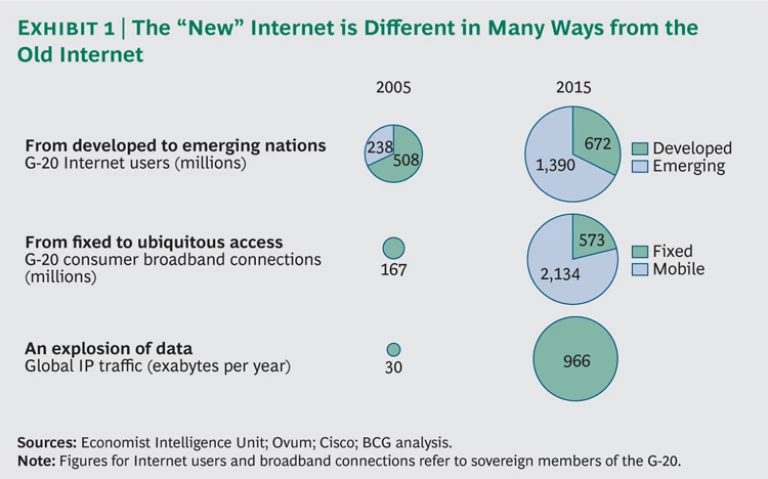Every business needs to “go digital.” Data about customers, competitors, suppliers, and employees
are exploding
. Ninety percent of all data were created in the past two years. By 2016, there will be 3 billion Internet users globally, and the Internet economy will reach $4.2 trillion in the G-20 nations.
Multimedia
The Digital Manifesto: A Video Animation
What does the rise of the “new” Internet mean for consumers, countries, and companies?
Interactive: BCG e-Intensity Index
The BCG e-Intensity Index measures Internet strength and activity across 50 nations.
No company or country can afford to ignore this phenomenon. The fact is that we have entered the “second half of the chessboard,” where the scale and speed of change are indelibly altering industry structures and the way that companies do business.
The “new” Internet is different in many ways from the old Internet. (See the exhibit below.)
- Its center of gravity is shifting. The Internet has become interactive and participatory. It is moving from fixed access to ubiquitous access. No longer limited to developed markets, it is growing by leaps and bounds in emerging markets, as well. And these countries are increasingly driving innovation.
- It is now an “Internet of everything.” IBM predicts that 1 trillion devices will be connected to the Internet by 2015. The Internet of everything can radically change the ways companies interact with customers and run their supply chains. It also allows new entrants to attack the foundations of traditional industries.
- It is about ecosystems. The Internet is increasingly being shaped by ecosystems orchestrated by companies such as Amazon, Apple, Facebook, and Google, but also by companies such as Baidu and Tencent in China and Yandex in Russia.
- It is generating tremendous economic value. Across the G-20 nations, the Internet economy amounted to 4.1 percent of GDP, or $2.3 trillion, in 2010, larger than the economies of Italy or Brazil. In some leading economies, it is contributing up to 8 percent of GDP, powering economic growth and creating jobs.
- It has gone local. The Internet experience has become an ingrained feature of everyday life, reflecting national characteristics as well as economic, political, and social influences specific to individual countries.
- A new generation has grown up on the Internet. The “Millennials” have vastly different expectations as employees, consumers, and citizens. The Arab Spring protests and grass-roots “occupy” movements in the West are only the most visible manifestations of the power of the Millennials to shape society and commerce.
These developments have consequences for companies and policymakers alike.
- Companies need to understand and strengthen their “digital balance sheets.” In an increasingly digital world, companies need to build their digital assets and reduce the digital liabilities, often organizational, that limit their ability to tap rich opportunities.
- Many companies require a digital transformation. Most will need to improve their people, processes, and organizational structures and adapt them to the digital world. Given the rapid pace of change and the intensity of competition, they will need to move away from long-term planning cycles and toward adaptive strategy setting.
- Governments can help shape the digital economy. They can support policies related to investment, innovation, education, consumer protection, and privacy. In many areas, they should recognize that a hands-off approach is the best option.
More than 15 years after the rallying cry was first heard, the Internet really is “changing everything.” As Walter Wriston, the legendary leader of Citibank, said in the 1980s, “Information about money has become almost as important as money itself.” That is true for every business today.






